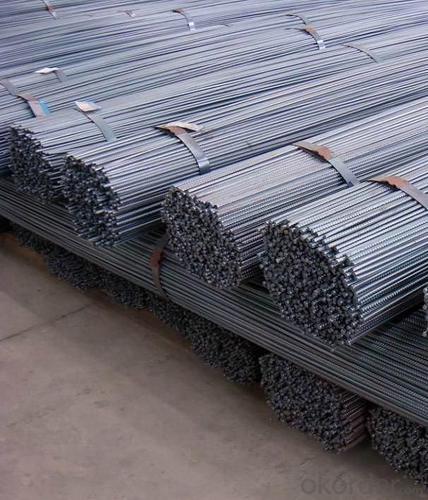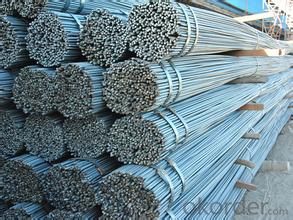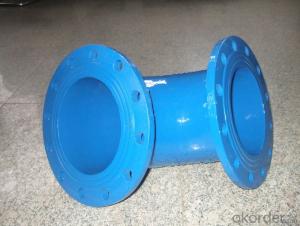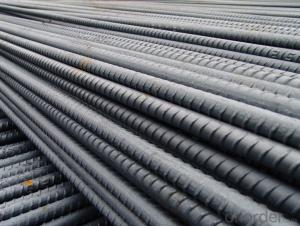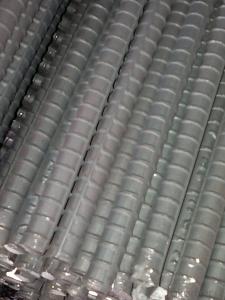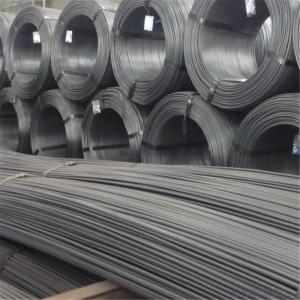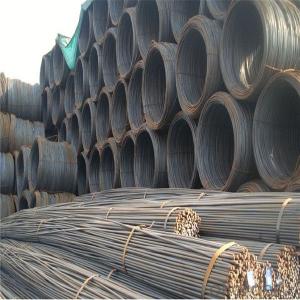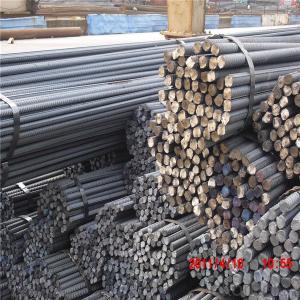Steel Reinforcing Rebar for Construction Usage
- Loading Port:
- Tianjin
- Payment Terms:
- TT or LC
- Min Order Qty:
- 1000 m.t.
- Supply Capability:
- 5000 m.t./month
OKorder Service Pledge
OKorder Financial Service
You Might Also Like
Steel Reinforcing Rebar for Construction Usage
Structure of Steel Reinforcing Rebar:
Type | Steel Reinforcing Rebar | MOQ | 500 MT (Trial order accepted) |
Standard Grade | GB1499.2-2007, HRB335, HRB400, HRB500. BS4449/2005, B500A, B500B etc.. ASTM A615 Gr.40, Gr60, KS, SD400, SD500 and so on.. | ||
Technique | Hot rolled continuous casting | Length | 6, 9,12m, or as requested |
Size | 6mm-32mm | Payment Terms | T/T, L/C at sight, Usance L/C |
Packing | In bundle | Inspection | Third party inspection accepted |
Trade terms | EXW, FOB, CFR, CIF | Transfer Term | FIO, FILO, FLT |
Delivery time | 15-30 days, according to the quantity | Note | Customized service is available (for sizes,length and chemical components etc.). |
Main Features of Steel Reinforcing Rebar :
HRB335 | Chemical composition | C | Mn | Si | S | P |
0.17-0.25 | 1.0-1.6 | 0.4-0.8 | 0.045 Max. | 0.045 Max. | ||
Mechanical Property | Yield strength | Tensile strength | Elongation | |||
≥335 Mpa | ≥455 Mpa | 17% | ||||
HRB500 | Chemical composition | C | Mn | Si | S | P |
0.25 Max. | 1.6 Max. | 0.8 Max. | 0.045 Max. | 0.045 Max. | ||
Mechanical Property | Yield strength | Tensile strength | Elongation | |||
≥500 Mpa | ≥630 Mpa | 15% | ||||
Specifications and Datas of Steel Reinforcing Rebar :
Deformed steel bar | ||||
Diameter (mm) | Theoretical weight (kg/m) | Pieces/Mt (pcs) | Length (m) | Standard |
6 | 0.222 | 375 | 12 | GB1499-48, HRB335, HRB400, HRB500 BS4449-97, Gr.460B,B500
|
8 | 0.395 | 211 | ||
10 | 0.617 | 135 | ||
12 | 0.888 | 94 | ||
14 | 1.21 | 69 | ||
16 | 1.58 | 53 | ||
18 | 2 | 42 | ||
20 | 2.47 | 34 | ||
22 | 2.98 | 28 | ||
25 | 3.85 | 22 | ||
28 | 4.83 | 17 | ||
32 | 6.31 | 13 | ||
36 | 7.99 | 10 | ||
40 | 9.87 | 8 | ||
50 | 15.42 | 5 | ||
FAQ:
Why choose us:
1. More than 10 years experience in this industry
2. 100,000 tons exporting per month
3. Professional foreign trade team
4. OEM&ODM capacity
5. High quality assured & competitive price
6. Try our best to meet your needs & save your budget
7. Very popular in Southeast Asia, Africa, Mid-East and South America etc.
8. VIP membership system, first time customers and long-term cooperation customers can get extra discount on some products.
Pictures:
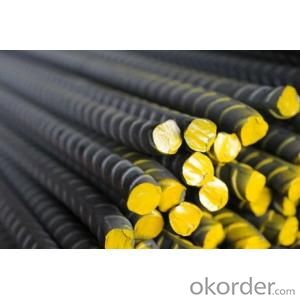
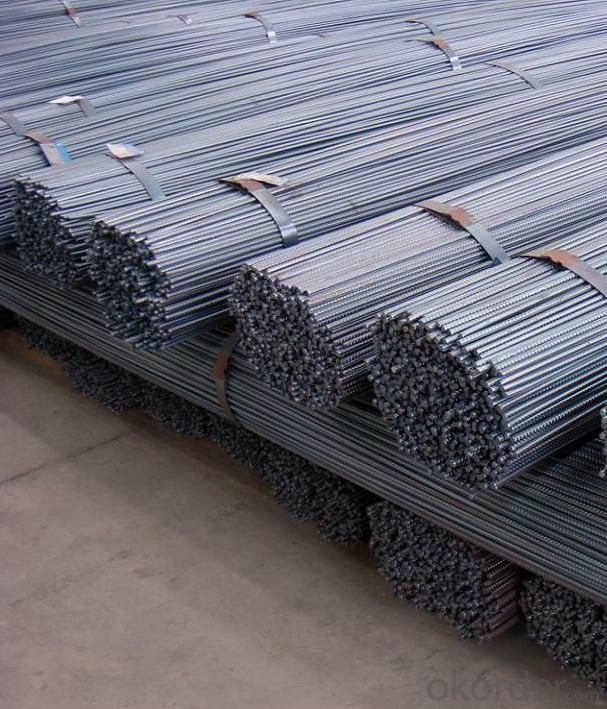
- Q: What is the internal lining used in ductile iron pipes?
- The internal lining used in ductile iron pipes is typically a cement mortar lining.
- Q: What is cast iron pipe?
- Cast iron pipes (Cast, Iron, Pipe), cast cast pipe. Cast iron pipes are used for water supply, drainage and gas transmission lines. They include cast iron pipes and pipe fittings. Labor intensity is small. According to the casting method, it is divided into continuous cast iron pipe and centrifugal cast iron pipe, in which the centrifugal cast iron pipe is divided into sand mould and metal type two kinds.
- Q: Are there any special coatings or linings used for ductile iron pipes?
- Ductile iron pipes utilize specialized coatings and linings to protect against corrosion and increase their lifespan. The interior and exterior surfaces of the pipes are treated with these coatings and linings. Several popular options for ductile iron pipes include cement mortar lining, polyethylene encasement, fusion bonded epoxy (FBE) coating, and polyurethane lining. Cement mortar lining is frequently employed to create a safeguarding layer on the inside of ductile iron pipes. This mixture of cement, sand, and water is applied to the pipe's interior surface. By doing so, it effectively prevents corrosion caused by water or other fluids flowing through the pipes. Polyethylene encasement is an additional protective coating used for ductile iron pipes. This method involves enveloping the pipes with a layer of polyethylene material. This barrier protects against environmental factors and inhibits direct contact between the pipe and the surrounding soil, minimizing the risk of corrosion. Fusion bonded epoxy (FBE) coating is a thermosetting epoxy powder coating that is administered to the exterior of ductile iron pipes. This coating provides exceptional corrosion resistance and mechanical protection. FBE coating is often utilized in aggressive environments where pipes are exposed to chemicals or high moisture conditions. Polyurethane lining is another type of lining employed for ductile iron pipes. It offers superior resistance to both corrosion and abrasion. This liquid polymer lining is sprayed onto the interior surface of the pipes, resulting in a smooth and durable protective layer that extends the life of the pipes. These coatings and linings are essential for maintaining the integrity and longevity of ductile iron pipes, ensuring optimal performance in a variety of applications such as water distribution, wastewater management, and industrial processes.
- Q: Are ductile iron pipes suitable for use in acidic environments?
- Ductile iron pipes are generally not suitable for use in highly acidic environments. While ductile iron is known for its strength and durability, it does have limitations when it comes to acidic conditions. Acidic environments tend to corrode and degrade ductile iron pipes over time. In acidic conditions, the acid can react with the iron in the pipe, causing corrosion and ultimately leading to pipe failure. The rate of corrosion depends on various factors such as the concentration and type of acid, temperature, and the duration of exposure. Acidic environments with pH levels below 4 or 5 can significantly accelerate the corrosion process. To overcome this limitation, other materials like stainless steel or corrosion-resistant alloys such as PVC or HDPE (high-density polyethylene) pipes are often recommended for use in acidic environments. These materials have better resistance to corrosion and can withstand the harsh conditions associated with acidic environments. However, if ductile iron pipes are used in mildly acidic conditions or if measures are taken to protect them from corrosion, they may still be suitable. Applying protective coatings or linings to the pipes can help minimize the corrosive effects of acids. It is essential to consult with experts or engineers familiar with the specific conditions and requirements of the project to determine the most suitable material for use in acidic environments.
- Q: What are the different coatings available for ductile iron pipe?
- Ductile iron pipes offer a range of coating options, each with their own advantages and protective qualities for different uses. Some commonly utilized coatings are as follows: 1. Cement Mortar Lining: By applying a layer of cement mortar to the pipe's interior surface, this coating provides excellent resistance against corrosion and abrasion. It is ideal for transporting water and sewage. 2. Bituminous Coating: Consisting of asphalt or coal tar pitch applied to the pipe surface, bituminous coatings offer effective protection against corrosion. They are commonly used for underground pipes in water and wastewater systems. 3. Fusion-Bonded Epoxy (FBE) Coating: FBE coatings are created by electrostatically applying an epoxy powder layer to the pipe surface, which is then cured at high temperatures. This coating offers exceptional corrosion resistance and is suitable for harsh environments and corrosive substances. 4. Polyurethane Coating: Polyurethane coatings provide excellent resistance against abrasion, impact, and corrosion. They are often used for pipes exposed to abrasive materials or requiring additional protection against external damage. 5. Zinc Coating: Also known as galvanized coatings, zinc coatings involve applying a layer of zinc to the pipe's surface. This coating offers excellent corrosion protection, making it suitable for pipes exposed to moisture and aggressive environments. 6. Polyethylene Encasement: Polyethylene encasement involves wrapping the pipe with a layer of polyethylene film or tape. This coating acts as a physical barrier against corrosion and is commonly used in conjunction with other coatings for added protection. To determine the most appropriate coating for ductile iron pipes, it is crucial to consider the specific requirements of the application, such as the type of fluid being transported and the environmental conditions.
- Q: Can ductile iron pipe be used for road and highway crossings?
- Yes, ductile iron pipe can be used for road and highway crossings. Ductile iron pipes are known for their high strength, durability, and flexibility, making them suitable for various applications, including road and highway crossings. They can withstand heavy loads and provide excellent resistance to external forces, making them a reliable choice for underground installations in transportation infrastructure.
- Q: Is there any cast iron pipe used in the fire hose?
- I don't know, I only know that the fire pipes produced by our company is the base tube is a pipe, and then coated with a corrosion and non-toxic, long service life, we are Suzhou Yuyao Pipe Industry Co. Ltd. is a professional production of the manufacturers, oh
- Q: Are ductile iron pipes suitable for sewage treatment plants?
- Yes, ductile iron pipes are suitable for sewage treatment plants. Ductile iron is a strong and durable material that can withstand the harsh operating conditions found in sewage treatment plants. It has high tensile strength and excellent corrosion resistance, which makes it resistant to the corrosive effects of sewage and other chemicals found in wastewater. Additionally, ductile iron pipes have a smooth interior surface that allows for efficient flow of wastewater, reducing the risk of clogs or blockages. They are also easy to install and maintain, making them a cost-effective choice for sewage treatment plants. Overall, ductile iron pipes are a reliable and long-lasting option for transporting sewage in these facilities.
- Q: How do ductile iron pipes perform in high-pressure applications?
- Ductile iron pipes perform exceptionally well in high-pressure applications. Due to their superior strength and durability, they can withstand the high-pressure conditions without any significant issues. The ductile iron material is known for its ability to handle high-pressure situations, ensuring the reliability and long-lasting performance of the pipes.
- Q: What is the typical lifespan of ductile iron pipes?
- The lifespan of ductile iron pipes can differ based on multiple factors, including pipe quality, environmental conditions, and maintenance practices. On average, these pipes typically last approximately 75 to 100 years. This longevity establishes them as a sturdy and enduring choice for water and sewage transport systems. Through correct installation and consistent upkeep, these pipes can endure corrosion, pressure, and other external elements, guaranteeing their durability and dependability. Furthermore, advancements in coatings and linings have extended the lifespan of ductile iron pipes, making them an exceptional option for infrastructure projects.
Send your message to us
Steel Reinforcing Rebar for Construction Usage
- Loading Port:
- Tianjin
- Payment Terms:
- TT or LC
- Min Order Qty:
- 1000 m.t.
- Supply Capability:
- 5000 m.t./month
OKorder Service Pledge
OKorder Financial Service
Similar products
Hot products
Hot Searches
Related keywords


